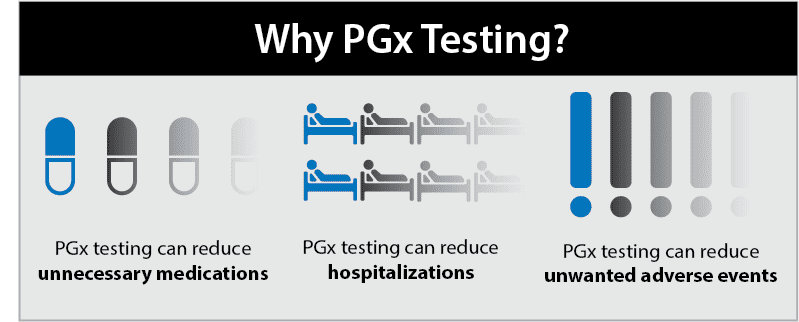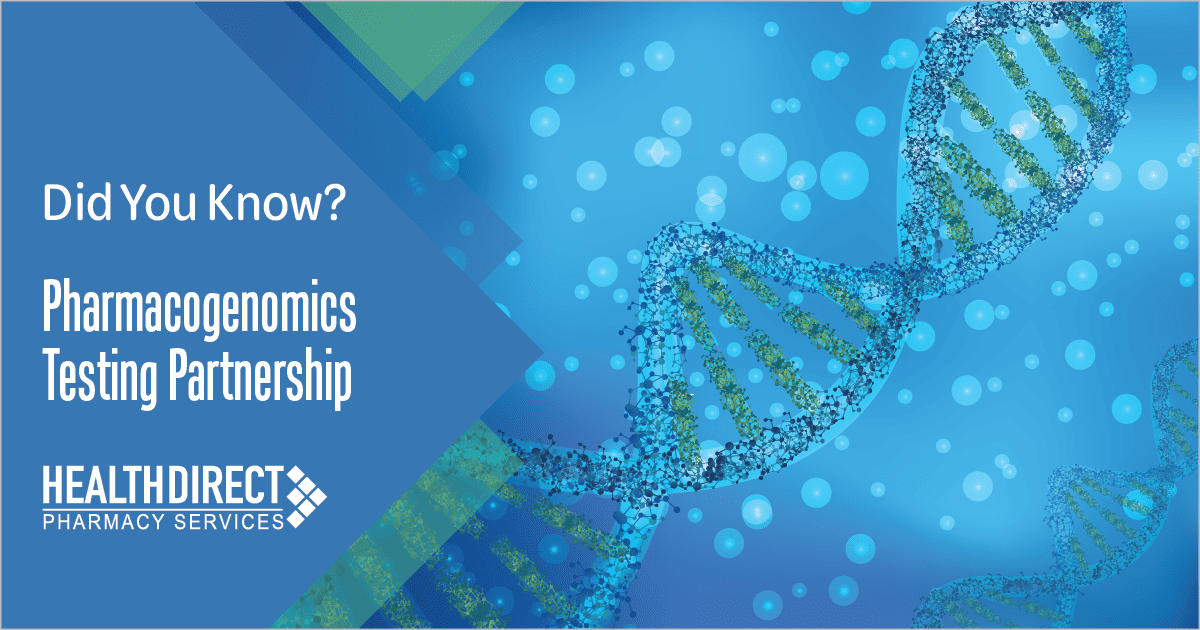What is Pharmacogenomics (PGx) testing?
PGx is rapidly evolving science focused on how an individual’s genes may affect his or her response to medications. While many patients may metabolize a medication appropriately, others may metabolize it too quickly, too slowly, or not well at all.
PGx testing identifies genetic variants that indicate potential drug-gene interactions – information providers can use to help guide clinical decision-making and ensure medications in the individual’s treatment plan are providing optimal therapeutic benefit. It can also help avoid unwanted adverse events that may result from errant medication metabolism.

When should I consider PGx testing for my community?
Per CMS, PGx tests are indicated when medications are being considered for use, or already being administered, that are medically necessary, appropriate, and approved for use in the patient’s condition and are known to have a gene(s)-drug interaction that has been demonstrated to be clinically actionable as defined by the FDA or Clinical Pharmacogenetic Implementation Consortium (CPIC) guidelines category A and B. For additional information, see FDA – Table of Pharmacogenetic Associations and CPIC- Guidelines.
Put another way, when medications are being prescribed with established potential for drug-gene interactions that can impact treatment success, PGx testing should be considered by clinical decision-makers to help guide therapy.
HealthDirect has partnered with leading PGx providers, Singulab and AccessDx Laboratory, to help facilitate access to precision medicine solutions via PGx for our partner communities.
How do HealthDirect & SinguLab deliver actionable PGx testing results?
Using validated gene-drug interaction data to create an individualized risk assessment, you will receive a comprehensive report for each patient detailing any anomalies to their genetic profile that may impact medications that are currently prescribed. Samples are obtained on site from a quick buccal swab.
SinguLab currently analyzes 39 genes based on the most recent evidenced-based data from internationally recognized PGx research organizations and bodies such as CPIC, the FDA, PharmGKB, and KNMP.
This drug-gene interaction panel provides analysis on over 200 medications across 13 clinical
specialties, some examples are highlighted in the table below, many of these medications are
common therapies we see in everyday practice.
Antidepresants
| Medication | Gene(s) |
|---|---|
| Amitriptyline (Elavil®) | CYP2D6, CYP2C19 |
| Bupropion (Wellbutrin®, Contrave®) | CYP2B6, ANKK1 |
| Citalopram (Celexa®) | CYP2C19, SLC6A4, GRIK4, FKBP5, HTR2A |
| Clomipramine (Anafranil®) | CYP2D6, CYP2C19 |
| Desvenlafaxine (Pristiq®) | CYP2D6 |
| Doxepin (Silenor®) | CYP2D6, CYP2C19 |
| Escitalopram (Lexapro®) | CYP2C19, SLC6A4 |
| Fluoxetine (Prozac®, Sarafem®) | CYP2D6 |
| Fluvoxamine (Luvox®) | CYP2D6, SLC6A4 |
| Imipramine (Tofranil®) | CYP2D6, CYP2C19 |
| Nefazodone (Serzone®) | CYP2D6 |
| Nortriptyline (Pamelor®) | CYP2D6 |
| Paroxetine (Paxil®, Brisdelle®) | CYP2D6 |
| Sertraline (Zoloft®) | CYP2C19 |
| Venlafaxine (Effexor®) | CYP2D6 |
| Vortioxetine (Trintellix®) | CYP2D6 |
Neurology
| Medication | Gene(s) |
|---|---|
| Brivaracetam (Briviact®) | CYP2C19 |
| Clobazam (Onfi®) | CYP2C19 |
| Diazepam (Valium) | CYP2C19 |
| Dronabinol (Marinol®) | CYP2C9 |
| Lorazepam (Ativan®) | UGT2B15 |
| Oxazepam (Serax®) | UGT2B15 |
| Phenobarbital (Luminal®) | CYP2C19 |
| Phenytoin (Dilantin®) | CYP2C9 |
| Primidone (Mysoline®) | CYP2C19 |
| Zonisamide (Zonegran®) | CYP2C19 |
| Dextromethorphan / Quinidine (Nuedexta®) | CYP2D6 |
| Donepezil (Aricept®) | CYP2D6 |
| Galantamine (Razadyne®) | CYP2D6 |
| Deutetrabenazine (Austedo®) | CYP2D6 |
| Tetrabenazine (Xenazine®) | CYP2D6 |
| Valbenazine (Ingrezza®) | CYP2D6 |
Cardiovascular
| Medication | Gene(s) |
|---|---|
| Atorvastatin (Lipitor®) | SLCO1B1, CYP3A4 |
| Fluvastatin (Lescol®) | CYP2C9, SLCO1B1 |
| Lovastatin (Mevacor®, Advicor®) | CYP3A4, SLCO1B1 |
| Pitavastatin (Livalo®) | SLCO1B1 |
| Pravastatin (Pravachol®) | SLCO1B1 |
| Rosuvastatin (Crestor®) | SLCO1B1, ABCG2 |
| Simvastatin (Zocor®) | SLCO1B1, CYP3A4 |
| Carvedilol (Coreg®) | CYP2D6 |
| Irbesartan (Avapro®) | CYP2C9 |
| Losartan (Cozaar®, Hyzaar®) | CYP2C9 |
| Metoprolol (Lopressor®) | CYP2D6 |
| Nebivolol (Bystolic®) | CYP2D6 |
| Propranolol (Inderal®) | CYP2D6 |
| Timolol (Timoptic®) | CYP2D6 |
| Clopidogrel (Plavix®) | CYP2C19 |
| Ranolazine (Ranexa®) | CYP2D6 |
| Warfarin (Coumadin®) | CYP2C9, VKORC1, CYP4F2, CYP2C |
* Not a complete list. For additional details on the medications and genotypes analyzed please contact your HealthDirect or Singulab / AccessDx laboratory representative.
ADHD
| Medication | Gene(s) |
|---|---|
| Amphetamine (Adderall®, Evekeo®) | COMT, CYP2D6 |
| Atomoxetine (Straterra®) | CYP2D6 |
| Dexmethylphenidate (Focalin®) | COMT, ADRA2A |
| Dextroamphetamine (Dexedrine®) | COMT, CYP2D6 |
| Lisdexamfetamine (Vyvanse®) | COMT, CYP2D6 |
| Methylphenidate (Ritalin®, Concerta®) | COMT, ADRA2A |
Proton Pump Inhibitor (PPI)
| Medication | Gene(s) |
|---|---|
| Dexlansoprazole (Dexilant®, Kapidex®) | CYP2C19 |
| Esomeprazole (Nexium®) | CYP2C19 |
| Lansoprazole (Prevacid®) | CYP2C19 |
| Omeprazole (Prilosec®) | CYP2C19 |
| Pantoprazole (Protonix®) | CYP2C19 |
| Rabeprazole (Aciphex®) | CYP2C19 |
Antipsychotics
| Medication | Gene(s) |
|---|---|
| Aripiprazole (Abilify®, Aristada®) | CYP2D6 |
| Brexpiprazole (Rexulti®) | CYP2D6 |
| Chlorpromazine (Thorazine®) | CYP2D6 |
| Clozapine (Clozaril®) | CYP1A2, CYP2D6, HTR2C |
| Haloperidol (Haldol®) | CYP2D6 |
| Iloperidone (Fanapt®) | CYP2D6 |
| Olanzapine (Zyprexa®) | CYP1A2, HTR2C |
| Paliperidone (Invega®) | CYP2D6 |
| Perphenazine (Trilafon®) | CYP2D6 |
| Risperidone (Risperdal®) | CYP2D6, HTR2C, DRD2 |
| Thioridazine (Mellaril®) | CYP2D6 |
Central Nervous System
| Medication | Gene(s) |
|---|---|
| Meclizine (Antivert®) | CYP2D6 |
| Metoclopramide (Reglan®) | CYP2D6 |
| Naltrexone (Vivitrol®, Contrave®) | OPRM1 |
| Ondansetron (Zofran®, Zuplenz®) | CYP2D6, ABCB1, SLC6A4 |
Analgesics
| Medication | Gene(s) |
|---|---|
| Celecoxib (Celebrex®) | CYP2C9 |
| Codeine (Codeine; Tussin AC®) | CYP2D6 |
| Fentanyl (Actiq®) | OPRM1 |
| Hydrocodone (Vicodin®) | CYP2D6, OPRM1 |
| Ibuprofen (Advil®, Motrin®) | CYP2C9 |
| Meloxicam (Mobic®) | CYP2C9 |
| Methadone (Dolophine®) | CYP2B6 |
| Morphine (MS Contin®) | OPRM1, COMT |
| Oxycodone (Percocet®, Oxycontin®) | CYP2D6 |
| Piroxicam (Feldene®) | CYP2C9 |
| Tramadol (Ultram®) | CYP2D6 |
Urology
| Medication | Gene(s) |
|---|---|
| Fesoterodine (Toviaz®) | CYP2D6 |
| Mirabegron (Myrbetriq®) | CYP2D6 |
| Tamsulosin (Flomax®) | CYP2D6 |
| Tolterodine (Detrol®) | CYP2D6 |
| Torsemide (Demadex®) | CYP2C9 |
* Not a complete list. For additional details on the medications and genotypes analyzed please contact your HealthDirect or Singulab / AccessDx laboratory representative.
How to access pharmacogenomic (PGx) testing for your community
- Ask your HealthDirect representative for more information on PGx opportunities and next steps. HealthDirect will coordinate with Singulab to run a free risk assessment report for your community.
- Following a review of your community’s risk assessment results, a SinguLab representative will schedule a time to collect the buccal swab specimens from your residents.
- Comprehensive PGx analysis results for tested residents will be received within a week of laboratory receipt later and will be reviewed with any clinical staff that wish to be involved.
What is the cost of this service to my residents and community?
PGx testing is covered by Medicare and other major payors when medically necessary. PGx testing is also covered by most commercial insurance providers with a copay. HealthDirect has secured a discounted rate of $249 for any uninsured individuals that have a medical need for PGx testing. Contact your HealthDirect or SinguLab representative for any questions on coverage determination.

SinguLab® is on a purpose-driven mission to optimize, innovate, and empower precision medicine programs nationwide by developing a comprehensive and programmatic approach to personalized patient care. With the strength of our multidisciplinary team of experts and carefully-curated Partner Network, we blend personalized diagnostics, evidence-based medicine, and clinical decision support to create sustainable and affordable personalized medicine programs for long-term care communities, pharmacies, and providers nationwide.




